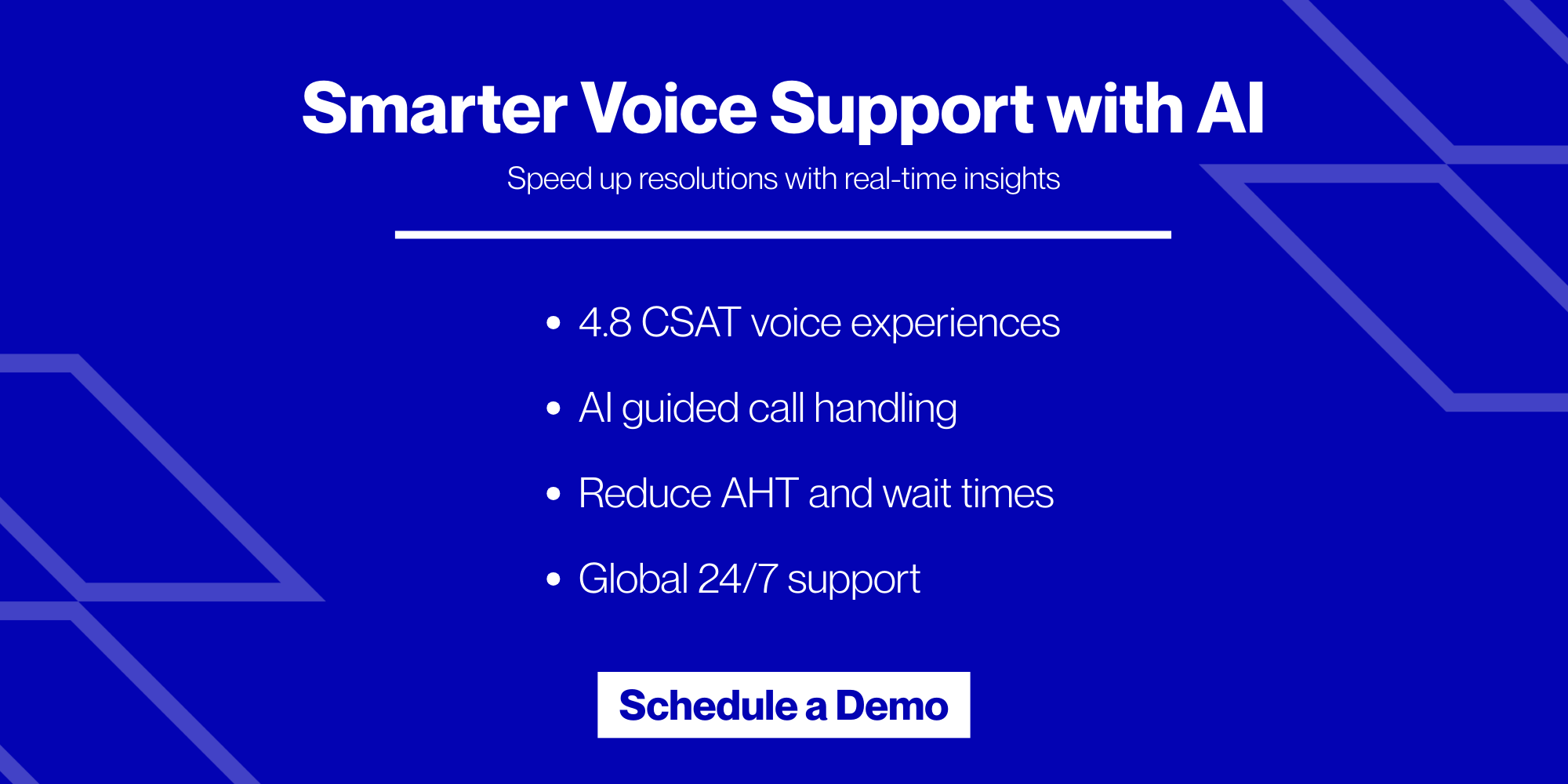Business voice solutions refer to communication technologies that allow companies to manage voice calls using internet-based or cloud-powered systems. These solutions are mostly related to VoIP, virtual receptionists, call analytics, IVR, and more. Through them, small businesses can deliver a professional customer experience (CX) across all touchpoints.
In 2025, small businesses aren’t confined to desks or landlines. Teams work from coffee shops, living rooms, or five different cities! But while the world went mobile, many phone systems stayed stuck in the ‘90s.
Are you amongst them? Nowadays, most D2C companies and consumer brands with $5M+ revenue and market base in the US, UK, and Australia are now switching to VoIP (Voice over Internet Protocol).
The major benefit? Switching to VoIP saves small businesses up to 75% on communication costs versus traditional landlines, with 40% saved on local calls and a massive 90% savings on international calls!
Want to achieve scalable growth + cut costs, + deliver better CX? Read this article till the end to learn what business voice solutions are, their major benefits, and the latest VoIP phone services for small businesses you can consider in 2025.
What are Business Voice Solutions?

Business voice solutions are specialized systems that allow companies to manage phone calls using modern technology, either through the internet or cloud-based platforms. These solutions replace old landline phones!
Usually, VoIP phone service for small businesses refers to the usage of the following tools:
- Internet calling (VoIP)
- Toll-free numbers
- Call recording
- Auto-attendants (press 1 for sales, 2 for support…)
- Call tracking
- AI-powered voice bots, and more
Nowadays, most voice solutions for small businesses are highly advanced and scalable. Several VPs, directors, and senior managers of D2C companies earning $5M+ revenue use them to handle customer calls and even to connect with remote teams.
5 Benefits of Voice Solutions for Small Businesses

Popular studies show that nearly 70% of all businesses have implemented VoIP. Out of them, about 45% of small-to-midsize enterprises (SMEs) are using VoIP as their main communications tool.
But why such popularity? Let’s check out five ways in which voice solutions for small businesses let you achieve scalable growth:
1. Save Money and Keep Costs Under Control
Old-school phone systems are expensive! You need special equipment, someone to maintain it, and you pay extra when your team grows. In contrast, voice solutions that run over the internet (like VoIP) don’t need all that.
- No phone lines
- No clunky hardware
You just need a good internet connection! Most providers charge a monthly fee, which is based on how many users you have. The benefit? You know exactly what you’re spending every month. Also, you can scale it up or down as per business requirements.
2. Grow Your Business Without Tech Headaches!
Whether you’re working alone or managing a team across cities, voice solutions for small businesses offer you high flexibility. You don’t have to call a technician or install new hardware.
Furthermore,
- Want to add a new employee? – Just log into a dashboard and create a new line. Done!
- Hiring seasonal staff? – Add temporary lines for just the months you need. Cancel anytime!
- Want your calls to ring on both desktop and mobile? – Set it once. Now, your calls follow you everywhere.
This kind of flexibility allows you to move faster. Also, most consumer brands operating in the US, UK, and Australia regions prefer business voice solutions to:
- Expand during boom business periods
and
- Pull back during slow months/ lean periods
3. Built-in Tools That Make You Look Bigger
Modern business voice solutions platforms, like Atidiv, offer features that used to be available only to large companies, such as:
-
- Auto-attendants that greet and direct calls
- Call routing that sends customers to the right person
- Virtual receptionists who answer on your behalf
Additionally, you also get tools that connect with your CRM or let you track all customer calls. On top of it, you get advanced analytics that show who’s calling and how long calls last.
4. Gives Customers a Better Calling Experience
Please realize that when your customers have urgent questions or problems, they prefer talking to a real person. Not chatting. Not emailing. Just calling!
Now, voice solutions for small businesses let you handle those calls better. How?
- Your customer calls get picked up faster
- They are sent to the right person
- The answers are provided with minimum wait times
Some systems even have smart assistants or language support to help every caller. Several growing consumer brands and D2C companies with 5+ employees have already adopted the voice solutions for small businesses in 2025 and are enjoying brand evangelism + high customer loyalty.
5. Stay Ahead with AI and Smart Automation
Studies show that in 2025, AI-powered VoIP tools like real-time voice transcription and call analytics are expected to grow by 35%. For those unaware, these voice solutions for small businesses allow you to enjoy smarter automation, such as:
- Instant call summaries
- Customer sentiment tracking
- Performance insights
The advantage? These features reduce manual work and improve response quality. Furthermore, you can start using “smart voice bots”. These bots can answer basic questions 24/7 without needing staff on call.
Also, these systems can spot patterns in calls. For example, they can tell you what questions people ask the most or where you’re losing leads.
Latest VoIP Phone Services for Small Businesses 2025

In 2025, the global VoIP services market is valued at an impressive $147.7 billion! The future? It is expected to reach up to $270.05 billion by 2029, with a CAGR of around 12% to 16.3%.
Are you missing the momentum? For your reference, below are the latest voice solutions for small businesses that most D2C companies and consumer brands operating in the US, UK, and Australia are adopting:
| Voice Solution | Meaning | Importance |
| PRI (Primary Rate Interface) | A phone line that gives you up to 30 call channels at once. Works through a physical setup. |
|
| SIP Trunk | Sends phone calls over the internet instead of old-style phone lines. |
|
| Centrex / IP Centrex | A virtual phone system that works like a company-wide internal network. There is no need to install expensive equipment. |
|
| CRS (Call Register Service) | Captures details of incoming calls instantly, such as:
|
|
| Toll-Free Number | Your business gets a number that customers can call without paying. |
|
| Hosted OBD (Outbound Dialer) | A system that automatically calls a list of people and plays a recorded message. |
|
| Hosted IVR (Interactive Voice Response) | An automated system that answers calls and guides callers with voice menus. |
|
Achieve Strong Business Growth with Atidiv in 2025!
In 2025, do you want to stay agile + deliver top-notch customer experiences? You can’t ignore voice solutions for small businesses! Yes, studies show that about 57% of small businesses nowadays rely on VoIP’s advanced call routing and handling features (such as automated call distribution) to improve customer service.
Additionally, modern voice tech reduces operational costs and automates customer interactions with AI. Once reserved for large enterprises, now such services are even available for growing consumer/ D2C companies earning $5M+ revenue.
Want to grow without the usual tech headaches? Atidiv is a trusted name in business voice solutions, with 70+ clients and 15+ years of experience! We offer both inbound and outbound voice support services as per your business needs.
Hire Atidiv today and give your customers the best voice experience. Book a free consultation now!
Voice Solutions for Small Businesses FAQs
1. How much does VoIP cost for a small business in 2025?
Most small businesses in 2025 pay about $12–$21 per user per month for a strong and reliable VoIP service. This often includes:
- Unlimited calling
- A virtual receptionist
- CRM integration
- Call analytics
Usually, all these services are bundled into a single plan.
2. Do I need expensive hardware to use business voice solutions?
No! In 2025, most modern voice systems run on the cloud and only need an internet connection. As a result, you can take calls on your phone, laptop, or desktop. There is no extra wiring or bulky equipment needed.
3. Can I use the same system if my team works from different locations?
Yes! Business voice solutions are specifically designed for remote and hybrid teams. All of your team members (no matter where they are) can be on the same system and use the same number or extension.
In this way, VoIP removes location barriers and supports flexible work without extra setup or cost.
4. How do business voice solutions help me reduce costs?
As a business owner, you avoid paying for multiple phone lines or expensive setups! SMEs that adopt VoIP report, on average, a 30% increase in team productivity. This largely happens due to features like:
- Mobile integration
- Remote access
- Advanced call management
Also, automation features save time and reduce support workload.
5. What if I only need phone support during peak seasons?
Most agencies offering voice solutions for small businesses let you scale up or down easily as per your business requirements. You can add temporary lines during busy months and remove them later without contracts or heavy charges.
6. Can I keep my existing business number when switching to a business voice solution?
Yes, most VoIP providers support “number portability”. You can keep your current business number. By doing so, you can avoid customer confusion and even protect your brand identity. Also, there is no need to reprint cards or change your website.

